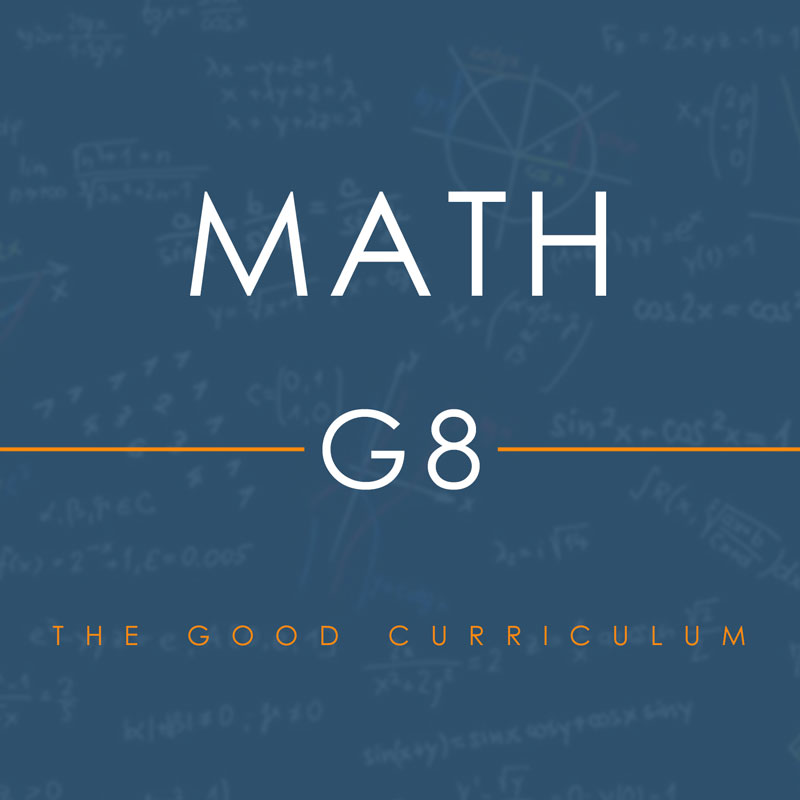Description
https://www.youtube.com/watch?v=EhXdzLhH8rc#action=share
Who am I?
My parents homeschooled me from the very beginning, starting in the early 1980s. There were not too many families homeschooling in the early 1980s. I attended a private high school. I took Advanced Placement exams in Calculus, Physics, English Composition, and English Literature, and received credit for my first year of college. I attended Covenant College in Lookout Mountain, Georgia, and received my bachelor’s degree in philosophy. I spent the last semester of college studying abroad at Oxford University. I received my master’s and PhD degrees in optical sciences from the College of Optical Sciences at the University of Arizona for research performed in the area of semiconductor cavity quantum electrodynamics. I am now an engineer on the Advanced Concepts Team of the R&D division of a photovoltaics manufacturer in Albuquerque, New Mexico. I am married and have three young boys.
Grade 8: Math
Grade 8 Math is a first year algebra course which provides you with the necessary mathematical skills to succeed in advanced high school mathematics. I teach you to be both comfortable with advanced abstract concepts and proficient in applying those concepts to real-world problems. In 8th grade, you will master the fundamentals of algebra including variables, factoring, functions, linear, quadratic and polynomial equations, graphing functions and inequalities, powers, roots and radicals, logarithms, algebraic fractions, and solutions to multiple equations. In addition, I introduce a number of fundamental geometrical concepts such as coordinate geometry, simple proofs and basic trigonometry. Realistic problems provide you with proficiency in applying algebraic and geometric concepts. After successfully completing 8th grade mathematics, you will have a solid mathematical foundation and be prepared to start Algebra II or Geometry and Trigonometry in high school. Grade 8 mathematics assumes that you are proficient in the basic arithmetic skills of addition, subtraction, multiplication and division, as well as fractions and decimals.
Math is a language, but many students who study mathematics only gain sufficient skill to mechanically solve problems using procedures that they have memorized. They have little or no understanding of why they solve the problems the way they do. In this course, you will learn math at a deeper level than that. In the video above, I note three levels of mathematical understanding. I will help you to achieve all three levels of understanding, but I cannot do it alone in videos that you watch. There is some extra work that you will have to do, in addition to watching the class videos and solving the problem sets.
Study Notebook: I want you to get a study notebook specifically for your mathematics classes, and you will need to make a written entry in it for every class that presents new material. For each new concept of skill that you learn, I want to write a short, clear explanation in your own words in your study notebook. You can solve one or two examples in your study notebook. But it is not a notebook for solving the problem sets. It is a clear explanation, in your own words, of each of the topics that we cover in this course. At first you may find this difficult and it may take quite a bit of time. But after a few weeks you will have had enough practice that you can make the entries in your study notebook in 15 minutes or less. Consider having a separate page for each entry. Then at a later time you can rearrange or organize your study notebook as you add more material. I think once you get used to the study notebook you will want to keep it and continue using it through the rest of your mathematics studies.
Explaining to a Friend: In addition to the study notebook, for each topic that we study, I want you to explain the concept or how to solve a problem out loud to a friend. Most likely you will explain it to an imaginary friend, but it could be a parent or another friend. The important thing is for you to hear yourself explaining the concepts out loud. If you don’t really understand the topic well, you will know right away when you hear yourself trying to explain it.
These two techniques, the Study Notebook and Explaining to a Friend, will help you develop a much deeper understanding of the math that we study than if you just watch the videos and do the problem sets. I expect that you will need to set aside about one hour per day for study, in addition to your time watching the videos. But there are no shortcuts to mastering mathematics. If you are diligent in using these techniques, in addition to watching the videos carefully and solving all of the problem sets, you will be well equipped to succeed in high school math and beyond.
For this class, you will need a scientific calculator (~$10 at Amazon.com); a tablet of graph paper; a three ring binder and college ruled notebook paper for your study notebook. Here’s a link to a good calculator:





Reviews
There are no reviews yet.